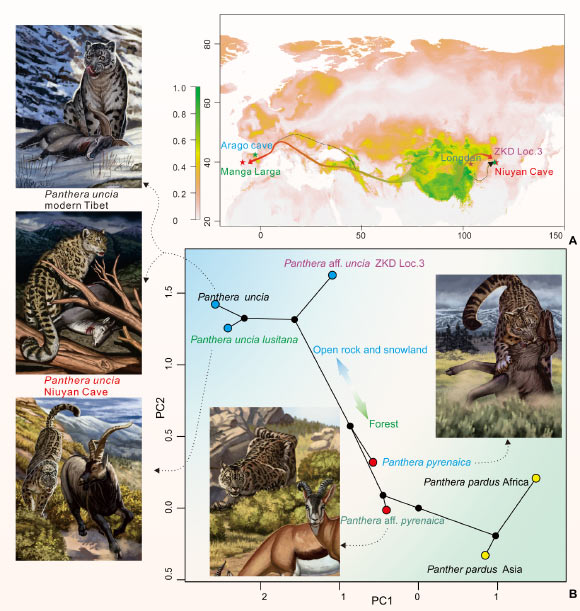The snow leopard (Panthera uncia) is a large feline unique to the Qinghai-Tibet Plateau and its surrounding areas. How this apex predator gradually adapted to the extreme environments remains unexplored due to the scanty fossil record in Tibet. In new research, scientists examined five outside-Tibet records of the snow leopard lineage. Their results suggest that the snow leopard dispersed out of the Tibetan Plateau multiple times during the Quaternary period. The anatomy of the modern snow leopard shows adaptations to the steep slope and cold/high-altitude environment. The new results suggest that the snow leopard experienced a gradual strengthening of such adaptation, especially since the Middle Pleistocene (0.8 million years ago).
The snow leopard is one of the iconic animals of the Tibetan Plateau and distributes also in the ranged mountainous regions of central Asia as the Mongolian Plateau.
It has distinctive features, e.g., long and dense pelage, long tail, short face, steep and wide forehead, large cheek teeth etc., that clearly distinguish it from the other members of the genus Panthera.
The snow leopard typically inhabits within high alpine regions, above 3,000 m, or above the tree line, but may also occur at much lower elevations below 1,000 m in some areas of Siberia.
The status of the snow leopard in IUCN’s Red List is Vulnerable, with 4,000 individuals. However, under global warming, its distribution is expected to be substantially affected, as moving northward or upward to a higher altitude.
“While the distinctive characteristics of the snow leopard have long been acknowledged, the correlation between these traits and its adaptation to the Tibetan Plateau environment, as well as their evolutionary history, remains largely unexplored,” said Dr. Qigao Jiangzuo, a researcher at the Institute of Vertebrate Paleontology and Paleoanthropology of the Chinese Academy of Sciences and Peking University, and colleagues.
“This gap in understanding…
Read the full article here

